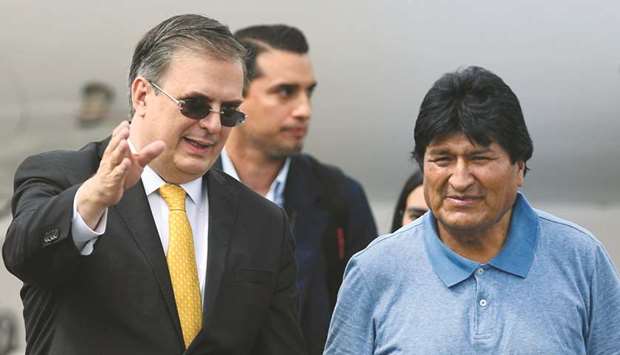Bolivia’s former leader Evo Morales yesterday landed in Mexico seeking asylum as security forces back home quelled violence over the long-serving leftist’s resignation and opponents sought an interim replacement to fill the power vacuum.
Morales, who quit after weeks of protests over a disputed October election, flew in a Mexican Air Force airplane from the town of Chimore, a stronghold where Bolivia’s first indigenous president retreated as his 14-year rule imploded.
Opposition lawmakers wanted to formally accept Morales’ resignation and start planning for a temporary leader ahead of a new vote.
But their plans looked at risk as Morales’ Movement for Socialism (MAS) said it would boycott the meeting.
Residents of the highland capital La Paz, rocked by protests and looting since the October 20 vote, said they hoped politicians would succeed in finally restoring order.
“Democracy has been at risk and hopefully it will be resolved today,” said resident Isabel Nadia.
Morales’ flight out was far from simple. Takeoff was delayed, with supporters surrounding the airport, then the plane was denied permission to fuel in Peru, Mexico’s Foreign Minister Marcelo Ebrard told a news conference.
So it stopped instead in Paraguay before arriving in Mexico City just after 11am local time (1700GMT).
“His life and integrity are safe,” Ebrard said, tweeting a photo of Morales alone in the jet with a downcast expression, displaying Mexico’s red, white and green flag across his lap.
In a region divided along ideological lines over Morales’ fall, Mexico’s leftist government has supported his accusations of a coup against him by political rivals.
In La Paz, roadblocks were in place after soldiers and police patrolled into the night to stop fighting between rival political groups and looting that erupted after Morales’ resignation.
The charismatic 60-year-old former coca leaf farmer was beloved by the poor when he won power in 2006.
But he alienated some by insisting on seeking a fourth term, in defiance of term limits and a 2016 referendum in which Bolivians voted against him being allowed to do that.
The government collapsed on Sunday after the Organisation of American States (OAS) delivered a damning report on irregularities during the October vote, prompting ruling party allies to quit and the army to urge Morales’ departure.
With Morales’ deputy and many allies in government and parliament also gone, opposition politician and Senate second vice-president, Jeanine Anez, was theoretically in line to take the top job temporarily and said she would accept.
However, in a sign of the complex path ahead, Anez tweeted a memo from Morales’ MAS, which said she was part of a coup and that Adriana Salvatierra, the Senate leader who resigned on Sunday, should instead lead the transition.
“Don’t they know that the ex-president of the Senate publicly resigned?” she wrote.
In Bolivia and around Latin America, detractors have exulted in the fall of a “dictator” while Morales’ supporters are denouncing a coup by right-wing foes determined to put Bolivia’s capitalist elite back in charge.

Mexican Foreign Minister Marcelo Ebrard (left) receives Bolivian ex-president Evo Morales upon his arrival in Mexico City yesterday.
